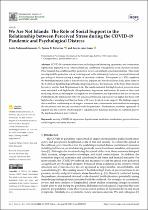| dc.description.abstract | COVID-19 containment measures, including social distancing, quarantine, and confinement,
significantly impacted social connectedness and contributed to heightened levels of perceived stress.
Prior research has established that protective factors can mitigate emotional distress. This study
investigated the protective role of social support in the relationship between perceived stress and
psychological distress among a sample of university students. Participants (n = 322) completed
the Multidimensional Scale of Perceived Social Support, the Perceived Stress Scale, short forms of
the Center for Epidemiological Studies Depression Scale, the trait scale of the State-Trait Anxiety
Inventory, and the Beck Hopelessness Scale. The results indicated that high levels of perceived stress
were associated with high levels of hopelessness, depression, and anxiety. In terms of direct and
mediating effects, social support was significant for depression and hopelessness but not for anxiety.
Furthermore, the relationship between perceived stress and depression was higher for those with
high levels of social support than for those with lower levels of social support. The findings suggest
that in addition to enhancing social support resources, interventions must assist students in managing
the uncertainty and anxiety associated with the pandemic. Furthermore, students’ appraisals of
support and the extent to which support is experienced as beneficial must also be examined prior to
the implementation of interventions. | en_US |

